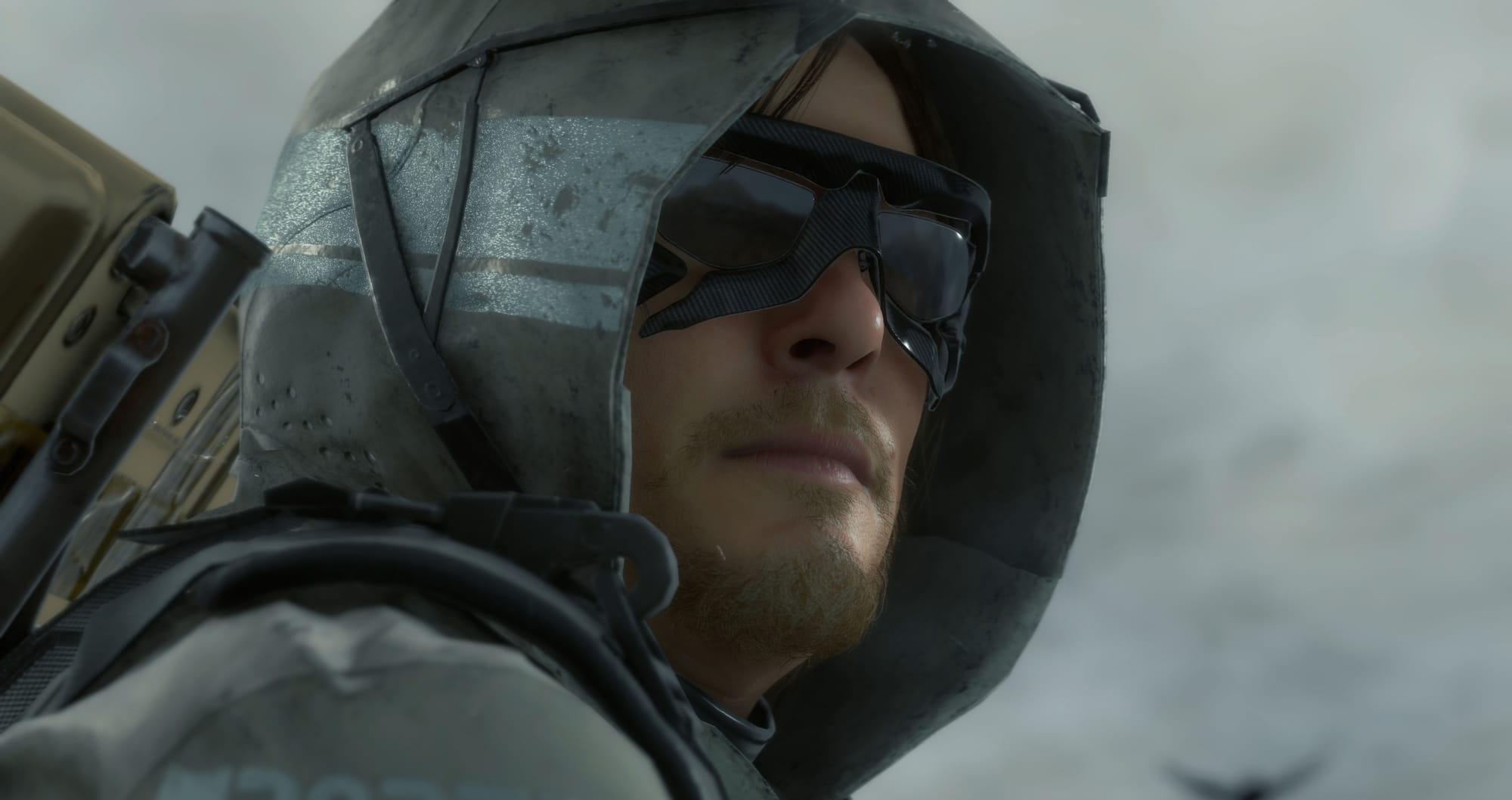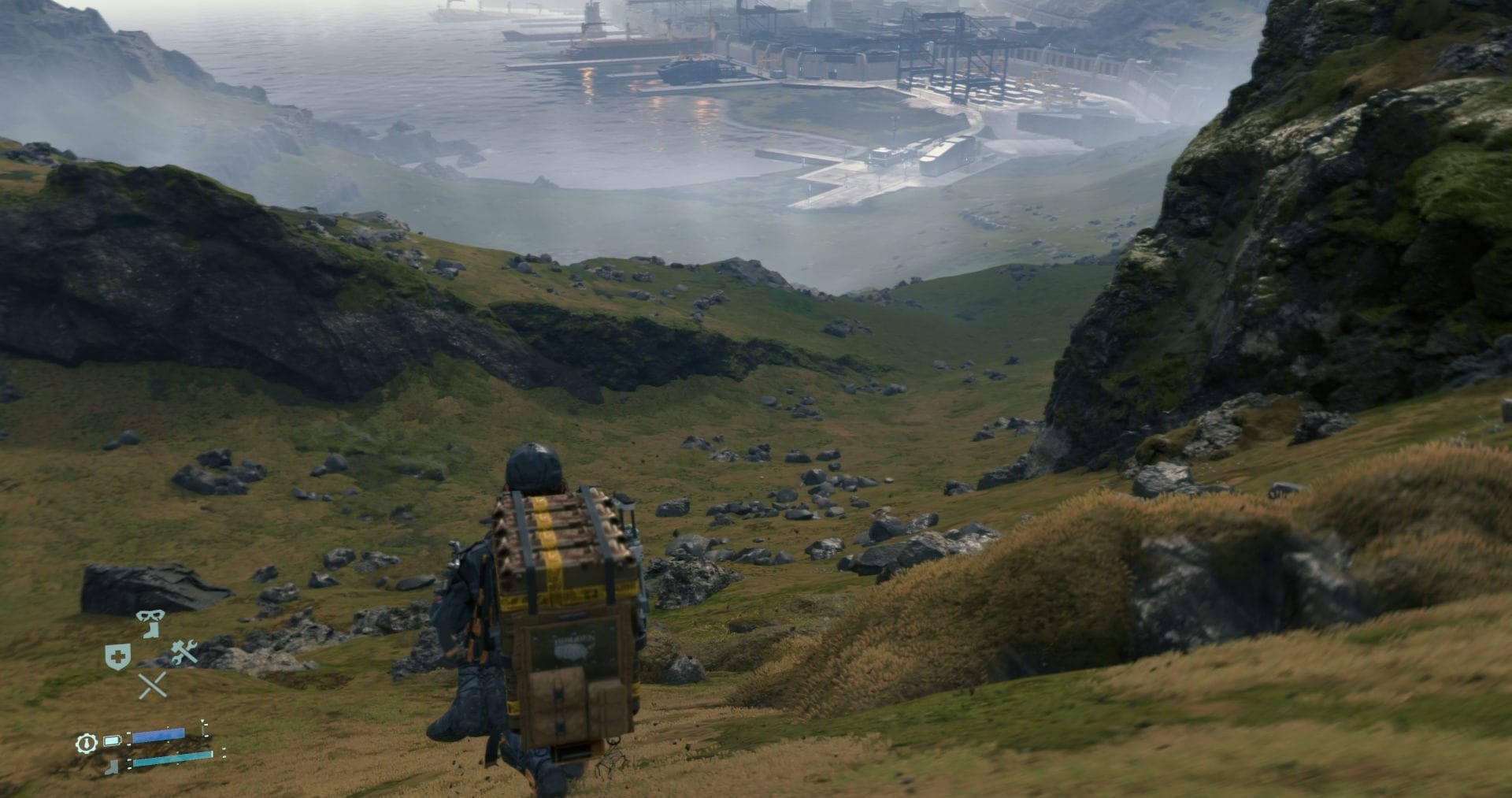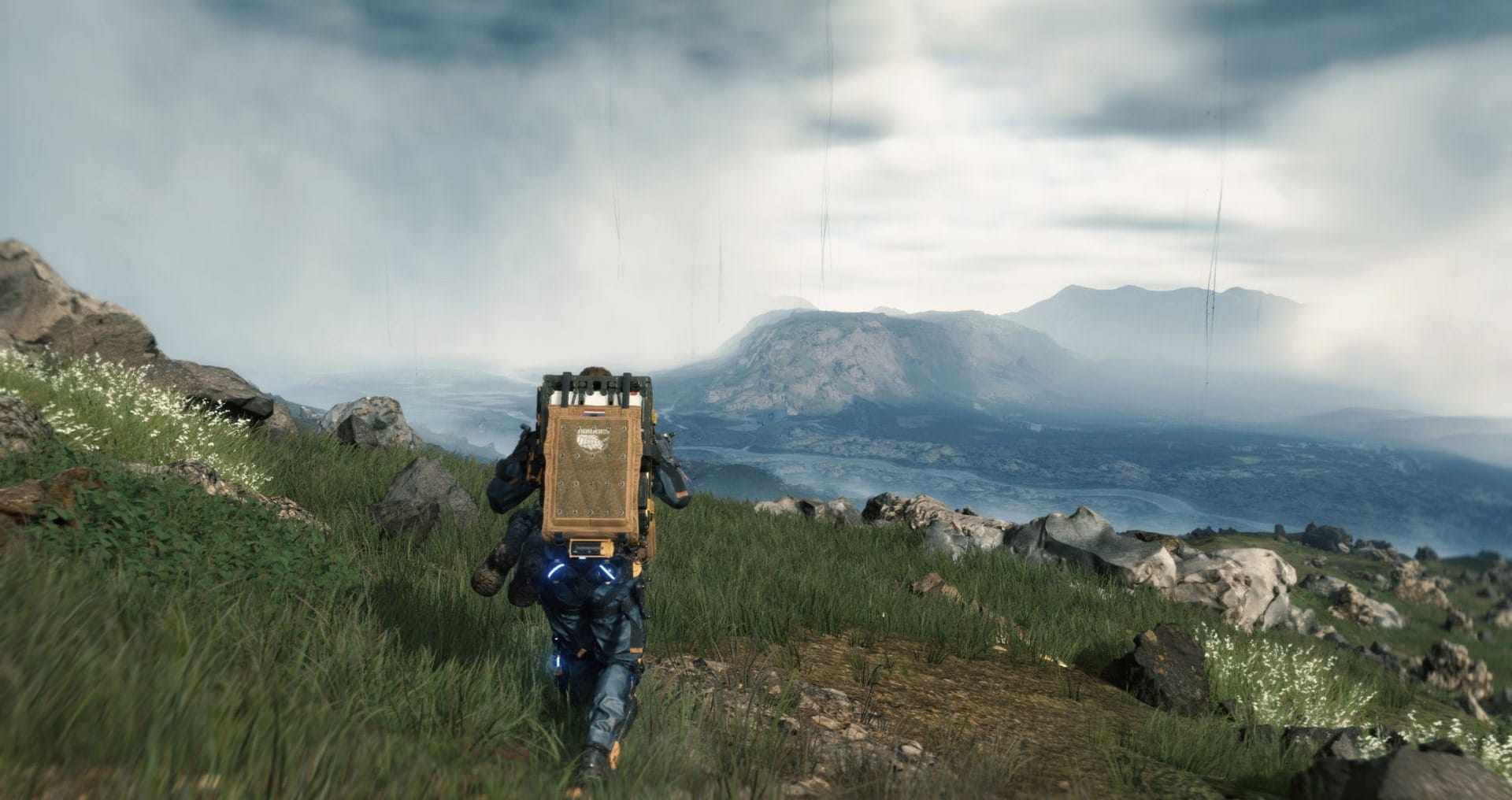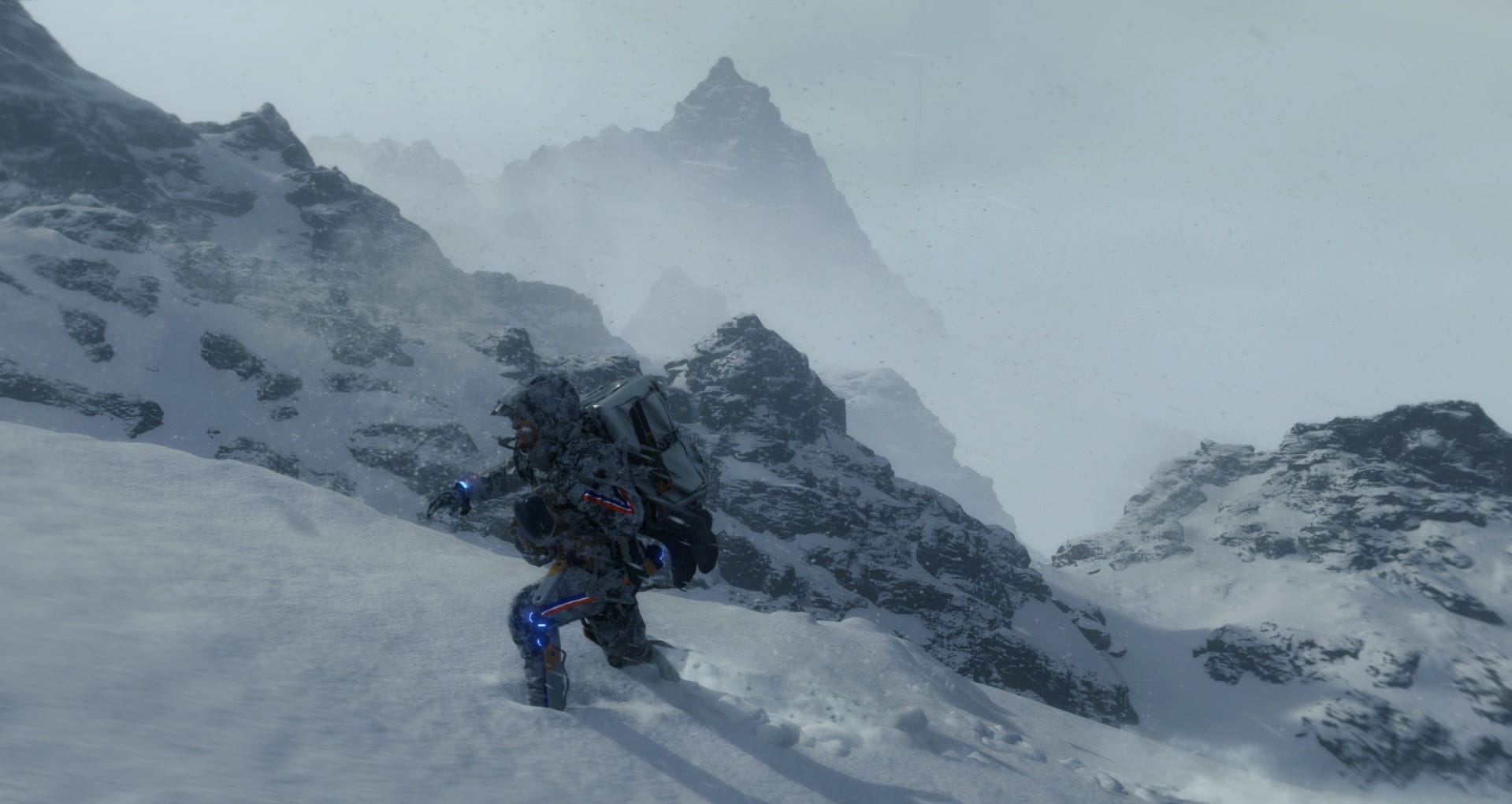Death Stranding and the Unfailing Perseverance of Optimism
Finding hope in every footstep

"I shall be telling this with a sigh
Somewhere ages and ages hence:
Two roads diverged in a wood, and I—
I took the one less traveled by,
And that has made all the difference."
Robert Frost’s famous poem about choice immediately splits its narrative. It focuses on the divergence of paths, about how one traveller, no matter how they wish, cannot set upon two roads at once. The poem’s truth, often overshadowed by the famous line “I took the one less travelled by,” lies in the necessity of choosing, even though a choice is never actually made. The narrator returns endlessly to the same leaf-shadowed crossroads, his life a repeating cycle where no amount of effort can conquer the path or the indecision.

Video games written and directed by Hideo Kojima skew toward a certain strangeness, and Death Stranding stays the course. The natural evolution of Kojima’s style lends itself to a materialist appreciation of nature, humanity, and technological industry; the adaptable futurism of his work is ethereal and astounding.
Hideo Kojima and his team created something undeniably special in Death Stranding. It's a hell of a lot more than a new iteration of Metal Gear Solid, and as we near the release of the sequel, we wonder if there is a bottom to his creative well. There is value in Death Stranding, and that value permeates every aspect of the game, from interaction to narrative. It's difficult to play Death Stranding and not come away with a persevering feeling of optimism, that no matter how dark things get, as long as human exists we can create, build, and strive toward tomorrow.
Death Stranding is all there in the title: we must contend with death’s holding pattern, look at the ending of all things, and appreciate that despite our efforts, we will fade to black. We can make our choices, but as small and fragile creatures, choices rarely amount to what necessitates a cosmic shift of fate.
Ghosts born from crude oil and abject despair. America is on its knees. Infrastructure destroyed, overgrown, corroded.
Despite it all, there is something here worth fighting for.
Fragile, But Not That Fragile
I was lucky to meet some virtual friends a few weekends ago. We were strangers and yet we were not. To put a face to a name, or better, to put a face to a screen name and avatar, was both anxiety-inducing and satisfying.
The subject of Death Stranding came up during dinner, and as the conversation pivoted to Kojima's masterpiece, we passionately regaled our feelings and experiences with this game, and how both its subject and setting have profoundly affected us. We talked about America, foreign perception, philosophy, and purpose. As with many games, Death Stranding's function as entertainment – as a video game – extends beyond its playtime. Its purpose lives beyond the on/off of a computer, and drifts with meaning to every person who experiences it, floating like cryptobiotes from one player to another.

Not every video game is so impactful. Five years on, Death Stranding certainly is a "strand-type" video game, connecting us in a world that increasingly feels disparate and disconnected. We do not have to be playing the video game in question to recall its meaning, and often, playing a video game is only a fraction of its worth.
Death Stranding portrayed an America that has grown increasingly recognizable: a cycle of emails, chores, and treks through the apocalypse. On a good day, maybe you grab an energy drink, listen to your favorite song, and shower before returning to the great unknown.
A Low Roar
Sam Porter Bridges is a secret optimist. I am too. Past his silence, beyond his agoraphobia, Sam's optimism is buried beneath his stoicism, in an ink-dark sea of misery fielded by the challenges he's overcome.
Americans speak candidly about deep emotions, psychological disorders, and personal morays, despite the surface-level hatred that's projected across social and political divides. We suffer communally, too often separated by meaningless and superficial judgments. Class and labor are the great uniters: you don't hate your neighbor, you simply don't know them.
Video games like Death Stranding allow us to see portrayals of disorders and illnesses, to accept differences without judgment, and to extend our empathy to those whose lives and experiences differ from our own. The America in Death Stranding is post-apocalyptic, but it’s also post-social. Daily activities have become integrated with social media, blurring the lines of community and breaking down borders in a destroyed landscape where human beings are forced to hide away lest they be consumed by nature. BTs, Timefall, and a brutal terrain have forced the survivors to shelter in place and retreat to message boards, emails, and news bulletins.
Loneliness has become an epidemic, but it's a salvageable one.
The Day Is Ending
What Death Stranding asks of its protagonist is monumental. A backpacking trip across a destroyed, decrepit America would be more than thankless. It would be nearly impossible. In this fragmented America, infamous for its crumbling infrastructure, Sam Porter Bridges must forge his own path, relying on limited tools, sparse technology, and the sporadic kindness of strangers.
Amid all this anguish and despair, Death Stranding establishes itself as a quiet, consolidated meditation, a repetition of tasks that became comfortable and enjoyable. I miss the contemplative action of trekking across insane geographies to deliver small but important parcels to beleaguered individuals. That slow trek toward the future — package by package — became a daily ritual. A friend of mine described it as the ultimate morning activity: he would wake up, make his coffee, deliver a parcel, and then head off to work. It was small and comforting.
“Keep on keepin’ on.” And I did. I would do it again.
“Come on. You’ve climbed worse than this,” Sam would mutter indignantly as I forced him up an impossible incline. It wasn’t a sole determination that kept me moving or the promise of answers throughout the game’s bizarre story. Those small encouraging statements created a network of support that left me feeling valuable and important.

I struggle with hope. It feels small. Realism and cynicism have often felt right — responding to the world in kind, reflecting the energy I receive. The fallacy of being a "realist" is akin to "common knowledge," as in we are products of our surroundings, as in what is true for one person is not true for another. It is difficult to look at the state of the world these days and not feel despair. I don't need to list the injustices. You know them.
But the Death Stranding 'Likes' are in the shape of a heart for a reason: we are supposed to interface with the world from a place of love.
Humans, Mules, and Homo Demens
Kojima infamously explores the human condition and the factors that influence it. Modern art and storytelling have responsibilities, even when it feels like escapist fiction is a survival measure against an increasingly hostile world. Death Stranding recognizes the futility of our plagues. We are no longer facing many slow deaths, but large ones. Big bangs. The collapse of civilization.
Throughout Death Stranding, different characters give their perspectives on extinction events, and how the planet has gone through several. We regularly hear and read news about unusual temperature fluctuations, flash floods, tornadoes, and hurricanes. The ‘death stranding’ will come for us all at some point. Humanity is a threat to itself, and while it’s popular to slip into the eco-fascist mentality, the powers that are ruining the planet exist so far beyond your influence that no amount of bamboo straws or brief showers can alter the course of doom.
Albert Einstein famously said, “I know not with what weapons World War III will be fought, but World War IV will be fought with sticks and stones.” Death, but more importantly, the perversion of it, is what leads to the state of the world in Death Stranding. The phenomenon connected disparate worlds — the living and the dead — and created Beached Things, souls stranded within the world of the living. America attempted to pervert the voidouts with the creation of Bridge Babies, causing more voidouts. Eventually, the world became one in which a lethal weapon was not only lethal to the individual but would lead to a catastrophic death event that could nuke entire cities.
Amelie: "Together you can help us reconnect. You can make America whole."
Sam Porter Bridges: "No, America's finished."
Capitalism and imperialism are not compatible with ecological sustainability. We shake our fists at the injustices brought on by the American way of life, but the systems in place are functioning as intended. It’s the resistance to these systems that creates a way of life — human rebellion begets the breaking of the wheel, the destruction of the status quo, and the emergence of tomorrow.
It’s established that the use of lethal weapons can create new cataclysmic events — literal craters will spawn if deaths happen during the death stranding. This is a heavy-handed metaphor for one of Death Stranding’s greatest pleas: put our weapons down and handle our conflicts with our words and actions. Pacifism isn’t just a way of life, it’s the only way we will see a true future. To be optimistic about the world is to come to people with open, empty hands. We have to genuinely believe that, across the gulf of our shared loneliness, every person we interact with suffers with their own beach.

Monsters On The Beach
Every step of Death Stranding’s journey oozes with hope. Tiny positive affirmations are the greatest rewards in the game. They’re the reason Sam walks the gorgeous landscape of this post-stranding America. A simple thumbs up is enough of a chemical hit to make a body continue with its most laborious task. A simple greeting and a thank you, are the building blocks of the new future. Persons existing in the most devastating moment of their lives are slowly brought back from the brink of absolute hopelessness by being given the one thing they need the most: positivity, a reason to live.
Amid a somber hellscape, the literal weight of the world on Sam’s back, I trudged on because I found these small promises of a better future addicting. Despite the cruelty of our present, despite the awfulness that gilds our meager lives, humanity strives onward in an endless machine that makes things work. We, in our rain-soaked, blood-caked nightmare, are spiked with the serotonin of thumbs up and congratulatory messages. We eradicate our DOOMS with hugs and kind greetings. We are the generation abandoned in the middle of chaos and death. We are the personification of immense effort.
It’s easy to give up. It’s easy to look at peril and believe that nothing will ever get better. The few individuals who find a way to move forward creatively, to pursue a better world despite the impending doom of non-existence, will be the ones that the future is built upon. It takes far more radical strength to smile amid despair than it does to give up and let the world die.
It's easy to look out across the beached landscape of tragedies and believe that an extinction event will cure us. Standing shoulder-to-shoulder with an invisible friend? That's our challenge.
